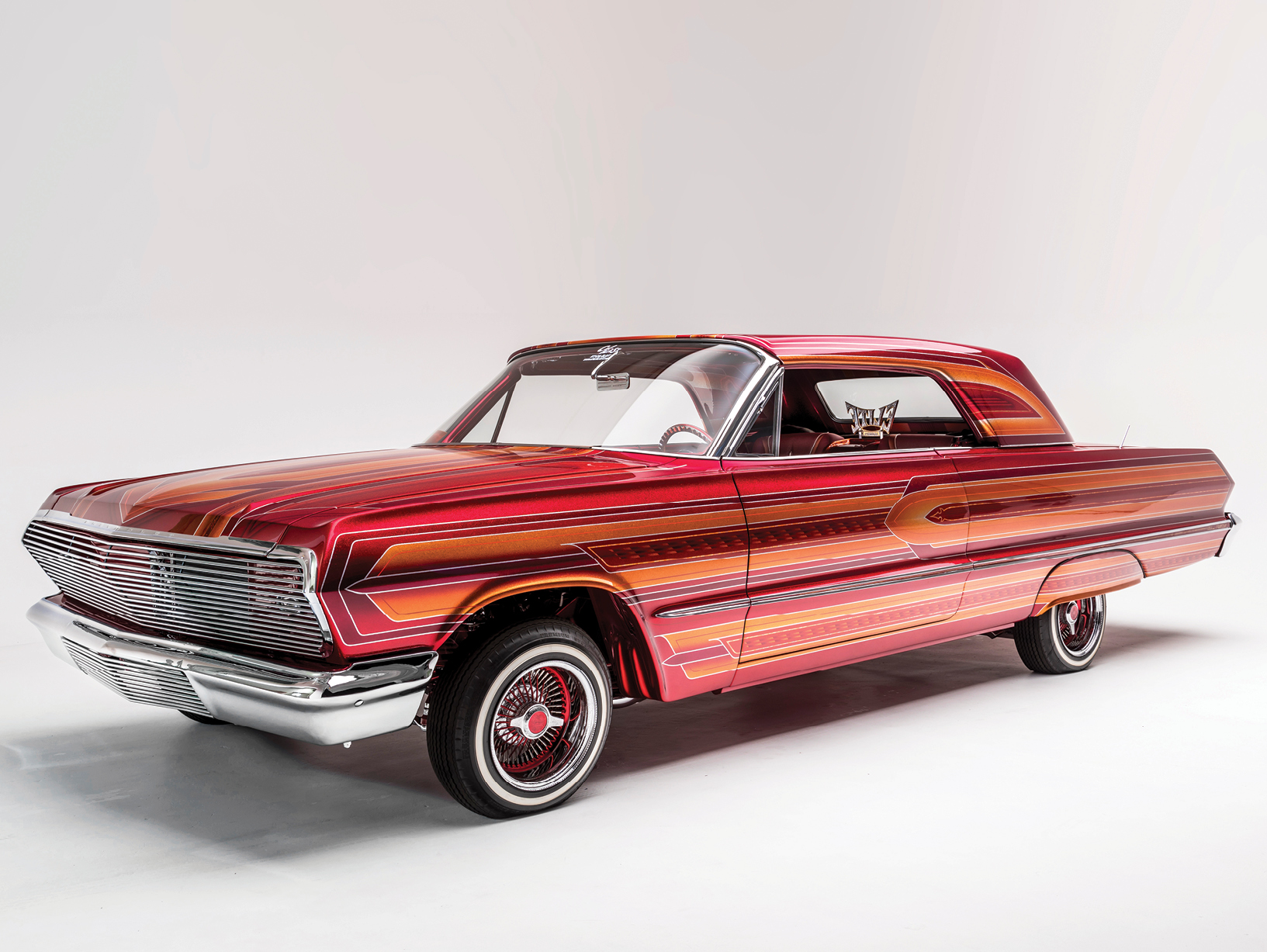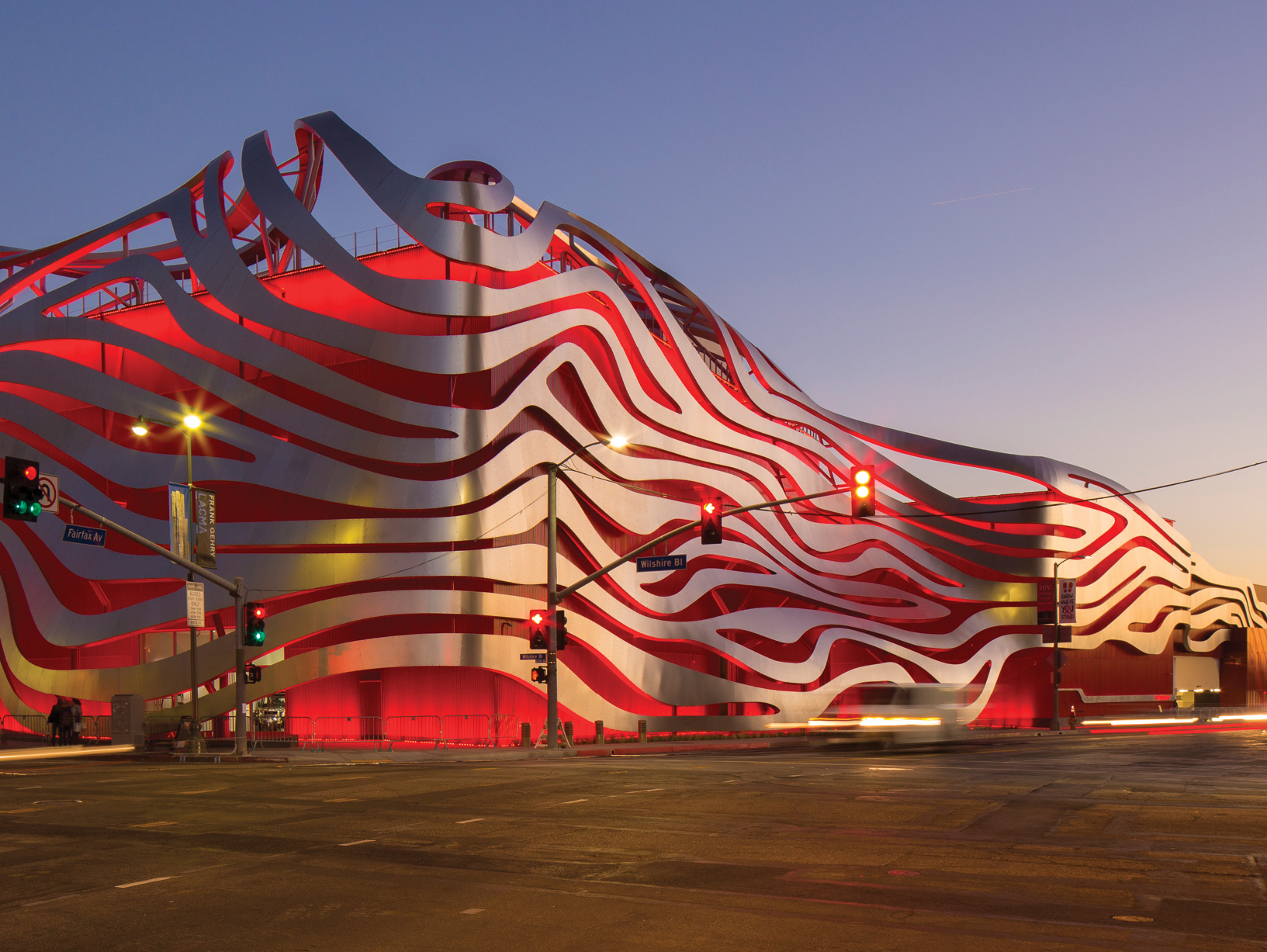Photo courtesy of Petersen Automotive Museum
At the turn of the twentieth century, cars became the vehicle (pun intended) for a transportation revolution.
Rather than relying on cumbersome horse-drawn buggies or steam-powered trains to travel, travelers could roam independently with the automobile. Once Henry Ford mastered mass production in the early 1900s, there was no turning back: the automobile, now more affordable, became the go-to mode of transportation for countless Americans.
After the World Wars, another auto boom started in the 1950s and 1960s as a result of several converging factors, including increased disposable income, the foundation of the national highway system, and technological advances that led to popular models like hot rods, muscle cars, and the Cadillac. Cars were becoming more than just practical—with more styles and colors than ever, a car could also be a statement piece, an extension of the owner’s identity, and even art.
Today, our love affair with the automobile is arguably stronger than ever. From movies (the Cars and Fast & Furious franchises) to songs to artwork, it’s impossible to ignore its place as a status symbol across the globe. One institution that celebrates this cultural icon better than any other in the country is Los Angeles’s Petersen Automotive Museum, which wows 400,000 visitors each year with both its collection of well-known and rare cars and its sheer passion for automotive history.

A beginning and an upgrade
The Petersen was the brainchild of publishing magnate Robert E. Petersen, an LA native whose lifelong love of cars is evident by the magazines he founded, including Hot Rod, his first, as well as Car Craft and Motor Trend. (Among the other notable mags his company published: Sport, Teen, and Tiger Beat.) Fueled by his passion, Petersen sought to celebrate the automobile’s history, influence, and culture by creating a museum in his hometown. He chose to transform a former three-story department store that took up an entire city block at the busy intersection of Wilshire Boulevard and South Fairfax Avenue. On June 11, 1994, his dream came true when he and his wife, Margie, opened the $40 million Petersen Automotive Museum.
Car aficionados enjoyed the museum as originally designed until 2014, when the Robert E. Petersen Foundation, which runs the Petersen today, began a $90 million modernization and expansion inside and out. Reopened the following year, it now boasts around 200,000 total square feet of space, about half of which is dedicated to car exhibits. These include We Are Porsche, featuring forty classic makes; Cars of Film and Television, where you can get an up-close glimpse at stars like Lightning McQueen, the DeLorean from Back to the Future, and the Batmobile from Batman and Batman Returns; and samples of Petersen’s own collection in Splendor and Speed. You’ll also be mesmerized by dozens of informative projectors—including a trio of projection walls each over one hundred feet long—throughout the museum and by its majestic three-story spiral staircase and new car elevator.
And, much like a classic flashy sports car, the Petersen’s exterior now stands out thanks to a hot-rod-red paint job and the installation of one hundred tons of wavy stainless-steel ribbons, all of which is illuminated at night by over eight hundred LED lights.

Enter the vault
Perhaps the most exciting part of the Petersen, though, lies deep below street level: the Vault. When you take a self-guided tour of this bounty-filled basement, you’ll feel like you have a private invitation to automobile history. The Vault contains over 250 pristine vehicles from the past 120 years to gawk over, from a turn-of-the-(twentieth)-century horse-drawn Studebaker to collections of various motorcycles, hot rods, and motorsports cars.
Virtually every make and model imaginable is in this automotive oasis, including many rare and one-of-a-kind gems. Where else could you feast your eyes on true pioneers like the Model T and the Duesenberg, legendary cars like a ’57 Chevy and ’64 Lowrider, and jaw-droppers like the very first Ferrari and a 24-karat DeLorean, all in one place? If you’re fascinated by Tinseltown, the Vault also has its own Hollywood Walk of Fame of sorts with Tony Stark’s Audi R8 from Iron Man, vehicles previously owned by celebs like Fred Astaire, Clark Gable, Elvis, and Steve McQueen, and more. It even houses a Popemobile!
Because of its sheer grandiosity, the Vault requires separate admission—but it is well worth the $27 price to have an automotive experience of a lifetime. To entice you even more, the Petersen began allowing handheld photography last year, so you can now capture your favorite moments at this amazing museum.

A dedication to education
Being such an avid history buff himself, it’s no surprise that Petersen’s vision for his attraction extended to educating people of all ages on the automobile. In addition to the endless interesting facts accompanying the cars on exhibit, you’ll find other exciting learning opportunities throughout the building.
For example, imagine being able to design your own car—that’s the focus of the Petersen’s free online auto-design courses (in partnership with Yellowbrick) taught by industry experts. Are you more of a speed demon? Check out Forza Motorsport, a galley of ten sit-down Xbox Forza racing simulators that allow you to feel what it’s like behind the wheel of a race car. And among the museum’s school-focused offerings are the Teen Auto Workshop, which welcomes high-school students to get their hands dirty learning about auto mechanics, and Little Sparks workshops on Saturdays, a fun-and-games time for youngsters that also teaches them basics about cars.
You don’t need to be a gearhead to be taken in by the beauty of a sleek car. As the must-see Petersen Automotive Museum illustrates with its mission and vast, eclectic collection, the art and history of the automobile can be appreciated in all its forms by anyone.
For more info, visit petersen.org
>>> Read full article>>>
Copyright for syndicated content belongs to the linked Source : AmericanLifestyleMag – https://americanlifestylemag.com/life-culture/editorial/the-petersen-art-of-the-automobile/










